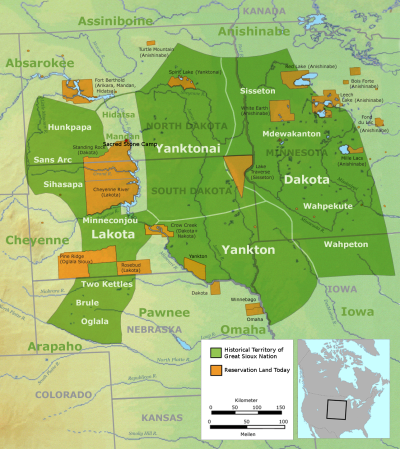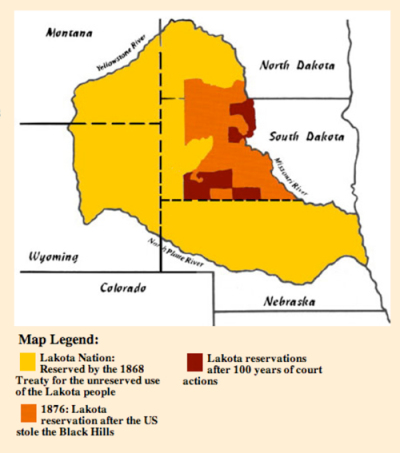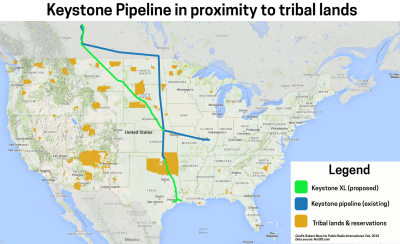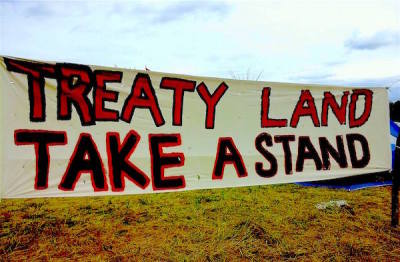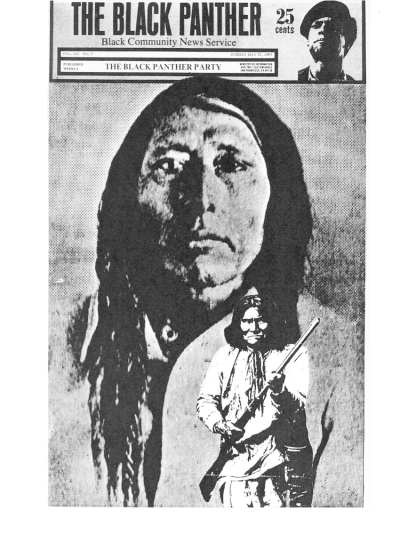On May 1, in the northern Alaska village of Tanana, two state troopers
were shot to death after being sent to the remote Alaska Native village
to arrest a resident for misdemeanor violations including driving
without a license and threatening a village public safety officer. The
man’s son shot the troopers as they entered into a physical altercation
to arrest him.
The issue has been sensationalized in the bourgeois press as an extreme
tragedy involving the deaths of the officers who were killed “in the
line of duty.” The young man who fired the shots is being vilified by
the media as a murderer and arch-villain guilty of killing two cops who
are painted as heroes and outstanding individuals. As droves of white
settlers attended the long procession of police cars carrying and
escorting the bodies of the troopers from the medical examiner to the
airport in Anchorage, hands over hearts and tears in eyes, nary a word
is to be heard in lament of the destruction of a young First Nation life
and family. Upon further, deeper examination however, a picture emerges
which places the emphasis on First Nation repression, police-state
tactics, and a long history of neglect by the white ruling class of its
oppressed, dependent and dominated rural native population.
It was not native or even just local law enforcement which came to
intervene and attempt to take into custody the alleged offender, it was
white outsiders who needed to be flown in from a far distant regional
hub in the tradition of the imperialist colonial model. These intruders
have no personal ties to such communities and they naturally are viewed
with resentment and suspicion. This sort of “law enforcement” is seen as
arbitrary, external, and illegitimate by many who are forced to
recognize its jurisdiction at the barrel of a gun. It is also
increasingly being challenged.(1)
At first glance, what would appear to have happened in this particular
situation is that a local individual who was transgressing some
relatively petty ordinances or laws (which, by the way, are mostly
foisted upon the First Nation people by white settlerism from far-off
white legislatures and courts) was confronted by what passes for law
enforcement in most rural villages - a VPSO, or “village public safety
officer.” The alleged offender did not want to cooperate with the VPSO
and threatened him. The VPSO then contacted state troopers. The troopers
were eventually flown in, attempted to arrest said individual and a
struggle ensued after the man resisted arrest. The man’s son, upon
witnessing this altercation, grabbed a firearm and shot the troopers in
defense of his father. The media is portraying the son as a “cowardly
and selfish” criminal who killed two of Alaska’s finest. But let’s now
dig more below the surface to understand the real elements behind this
unfortunate circumstance.
The father and son are connected with a group called the Athabascan
Nation (Athabascan being their particular native tribe). This group
denies the authority of the state over native lands. They have also
questioned and challenged the authority of the VPSOs.(2)
The position of VPSO was created by the state legislature. Instead of
allowing First Nation sovereignty, and also even allotting appropriate
funding for tribes to create their own, this was the state’s way of
providing a law enforcement presence in villages.
Most VPSOs are the equivalent of a native “Uncle Tom,” a puppet of the
“man.” Though it is only the equivalent of putting a band aid over a
gaping wound, many tribes in the south have been granted a form of
limited sovereignty under a set of laws incongruously titled “Indian
Country.” The Navajo Reservation in New Mexico is an example. However,
in Alaska, a clever piece of settler legislation called the Alaska
Native Claims Settlement Act killed “Indian Country” sovereignty in
Alaska and instead regional “corporations” were set up, which in turn
were given lucrative contracts on oil and mineral exploitation (most of
which is still dominated by Euro-Amerikan multinationals like BP and
Exxon anyway). These corporations make considerable amounts of money for
a relatively few shareholders while providing limited health care and
other services but little else. In other words, it was and is the
Euro-Amerikan exploiter class’s way of bribing a significant enough
portion of Alaska natives to be content with being an otherwise
plundered and oppressed colonial, subjected people. This has effectively
kept most pacified, while corporations appropriate natural resources,
including oil, gas, minerals, timber, fish, etc, worth billions of
dollars to the ruling class exploiters.
In order to maintain complete control over these lands, the white
plunderer ruling class has even imposed their own arbitrary laws and
regulations on the First Nation peoples’ way of life – their traditional
and time-honored means of subsistence. As an example, state fish and
game officers forcefully prevent indigenous peoples from harvesting food
resources that they have for thousands of years, in the name of
preserving stocks and preventing depletion (so that great white hunters
won’t run short on sport-hunting). They are then forced onto the rolls
of social welfare programs such as food stamps, thereby making them into
a totally dependent population. The social evils this has produced are
numerous and horrendous, including creating feelings of inadequacy and
worthlessness amongst a formerly proud and self-sustaining, independent
people and therefore contributing in large part to the extremely high
rates of suicide and drug/alcohol dependency and in effect inflicting
another indirect genocide on the First Nation peoples.
There is, of course, something patently obscene with a nation who have
historically been the biggest polluters and foulers of the earth
imaginable telling those engaged in indigenous practices that have
proved sustainable over generations what they can and can’t do on their
land. From over-fishing by commmercial fisheries, mines like Pebble
Copper and Usibelli Coal and, of course, fossil fuel extraction,
Amerikan dominance of the Alaskan territories has brought ecological
disaster. This March was the 25th anniversary of the Exxon Valdez oil
spill, which dumped 11 million gallons of crude oil into Prince William
Sound, killing hundreds of thousands of shorebirds. While bird
populations are recovering, others have not, including the local Orca
populations that have continued to decline since the spill.(3) And
that’s only beginning to scratch at the surface of the farcical nature
of white colonial rule.
Returning to the VPSO issue, it can be seen they are only a quisling
representative of white colonial rule and are additionally so powerless
that they all are even unarmed, making them completely dependent on
state enforcement. Tribal councils themselves are little more than
puppet shows. Tribal authorities rarely challenge state rule or push for
sovereignty because they are, for the most part, bought-off. They don’t
want to lose state funding and corporate backing or jeopardize their own
salaries and positions. Members of the Athabascan Nation and other
similar groups recognize this and fight against their treachery and
hypocrisy. Unfortunately, the latest action against the troopers by an
over-idealistic and perhaps protective young man amounts to focoism that
has destroyed his life, but this has shed a lot more light on the need
for natives to assert far more control and autonomy over their own
affairs separate from state interference.
Showing their complete disregard for their own and their status as
lapdogs of state authority, the tribal council of Tanana moved to banish
the man troopers came to arrest as well as another “aggressive” member
of the Athabascan Nation, calling them “intolerant.” Why not also banish
outside, militant and aggressive officers of an oppressive regime bent
on stealing and keeping your land? They’d rather banish two of their
own? This speaks volumes.
In contrast, even the young man who is accused of shooting the cops
seems to have had a better grip on who his real friends and enemies
were, as, even though he also drew a bead on the native VPSO who was
present, he lowered his gun and declined to harm him. This in itself
speaks loudly for the need for tribes to govern and police themselves.
It is far harder to harm someone you identify with or know, than it is
someone you have had no interaction with and view as a foreign
aggressor. It is also interesting that after the shootings, the local
VPSO was able to take the young man into custody with the help of a few
community members without further incident. So clearly, this was not,
contrary to most media reports, a case of an out-of-control, criminally
minded and dangerous coward, but a young First Nation man coming to the
defense of his father who was being accosted and assaulted without due
cause by an aggressive, militant and foreign force he did not recognize
and rightfully viewed with hostility and distrust.
Not very surprisingly, even reformist measures such as the concept of
“Indian Country” are vehemently opposed by the state government. If
enacted, this would take away state authority and create a dual-legal
system on the small amount of tribal (vs. corporate) lands that would
become “Indian country.”(4) In other words, the white settler state
might lose its ability to fully plunder and loot the First Nation people
and their land, and lose its ability to legally impose its will on the
people by force.
We must fight for the national self-determination of First Nations. The
imperialists must be forced to end their absolute hegemony and
domination over the indigenous populations and the vast wealth of their
country. The First Nation people must not be subjected to a cruel,
indirect genocide and forced assimilation into white Euro-Amerikan
“culture,” with all its comparatively decadent values, fetishization of
money, and inherent corruption.
The only solution is the revolutionary one - to support and accept
nothing less than full First Nation sovereignty for all indigenous
peoples.

